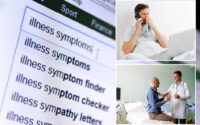I was told I couldn’t have a child — how I miraculously got pregnant
A woman from England had given up hope after spending nine years trying for a baby.
But she was in for the surprise of her life after she finally conceived her daughter, Ava, in 2021.
Lauren Whisker, 30, was told by doctors that she wouldn’t be able to have children because she suffers from a condition called Polycystic Ovarian Syndrome (PCOS).
PCOS causes reproductive hormones to be imbalanced, affecting the ovaries, according to the Cleveland Clinic. The condition left Whisker with both abdominal pain and irregular periods.
“They said it was very unlikely I’d be able to have a baby,” Whisker told South West News Service.
“I just felt sad that I wasn’t going to become a mum.”
After her PCOS diagnosis in 2019, Whisker decided to stop trying for a baby after nine years. She had begun to look into IVF, but when the coronavirus pandemic hit, she had to put the process on hold.



So, of course, Whisker was shocked when she found out that she was pregnant in July 2021 after her doctors suggested that she take a test.
“In July 2021, I woke up with pain in my stomach and rang the doctors, as I thought it might be my PCOS,” the Manchester resident told SWNS.
“They told me to do a pregnancy test, and it came up with two lines,” she continued. “I was in shock; I cried.”
When the 30-year-old took the test, she learned that she was eight weeks pregnant.
Whisker noted that she got pregnant right after she got her COVID-19 vaccination. It’s something that she said was a “coincidence,” but she still wonders if it somehow helped at all.



However, according to the Centers for Disease Control and Prevention, there is currently no evidence that COVID-19 vaccinations affect fertility.
Current studies also have not found or shown any differences in pregnancy success rates for women who have had the vaccine and those who haven’t, the CDC reported.
However, after Whisker found out the happy news, she ended up splitting with her partner and decided to raise her baby alone.
Her pregnancy went smoothly until she was about 37 weeks when doctors discovered that her daughter was measuring small.



They decided to induce her, and Whisker’s “miracle” daughter, Ava, was born on Jan. 25, 2022, weighing in at 5 pounds.
“I held her for the first time and I was shaking,” Whisker told SWNS.
“I can’t believe she is here and she is mine.”
The two of them were able to come home from the hospital the following day and, so far, Whisker thinks that motherhood is “amazing,” describing her daughter as “cheeky.”
Whisker also hopes that her story can encourage others to keep going in their fertility journeys.
“Don’t give up – the time will come when you are ready,” she said.


